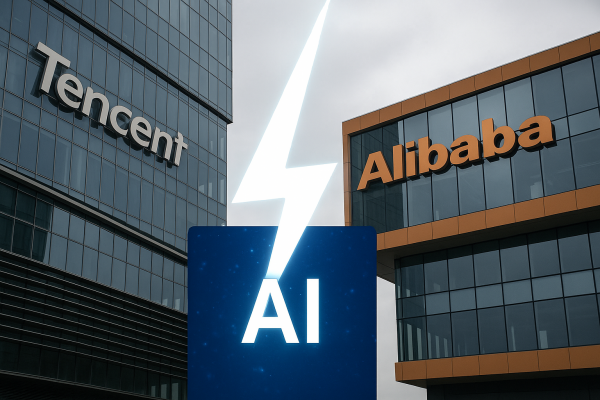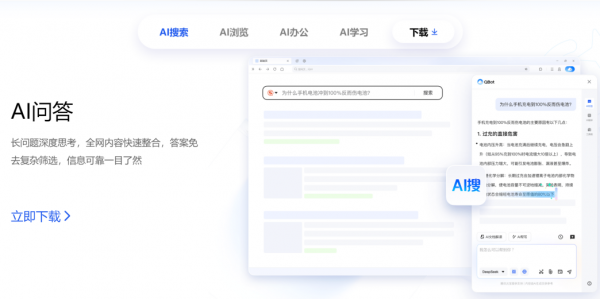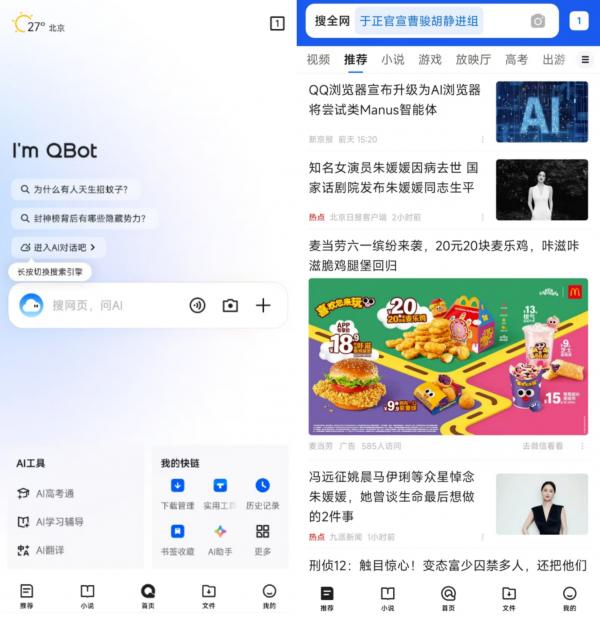Tencent vs Alibaba: The "Wu vs Wu" Battle in AI to C
![]() 05/22 2025
05/22 2025
![]() 582
582

The AI Entry War between Tencent and Alibaba.
Author | Jingxing
Editor | Wenchanglong
Tencent and Alibaba's AI to C strategies are officially clashing.
On May 19, QQ Browser, a product under Tencent's CSIG (Cloud and Smart Industries Group), announced that the product has officially been upgraded to an AI browser, launching a new AI QBot and equipping it with Tencent's Yuanhen and DeepSeek dual models.
Since then, Tencent's CSIG has gathered two major AI to C products - Tencent Yuobao and QQ Browser, forming a confrontation with Alibaba's similar products Tongyi and Quark. Wu Jia from Alibaba and Wu Zurong from Tencent, the core leaders of the two companies' AI to C strategies, also coincidentally staged a "double Wu" confrontation.
Perhaps to outshine Alibaba in the AI battlefield - in February this year, Quark announced a comprehensive upgrade to AI search, bringing a new AI experience to 200 million users; after QQ Browser announced its upgrade, Tencent's PR Director Zhang Jun immediately forwarded the relevant content and wrote: "QQ Browser has been comprehensively upgraded today, with 400 million users entering the AI era at the speed of light."
Previously, Tencent may have attempted to make WeChat the primary entry point for AI to C. For example, an AI search option was embedded in WeChat search. However, due to its social product positioning, WeChat struggled to fully transform into an AI product. Now that Yuobao and QQ Browser have been transferred to CSIG, they have finally freed up their hands - they can serve as Tencent's vanguard in AI to C without any constraints.
Currently, to compete for the AI high ground, Tencent and Alibaba are pulling out all the stops. The first-quarter financial reports of this year show that Alibaba's capital expenditure was 24.6 billion yuan, a year-on-year surge of 121%; Tencent's capital expenditure was 27.5 billion yuan, a year-on-year surge of 91%, with AI-related business capital expenditure accounting for 23 billion yuan, over 80% of the total. A Tencent employee said, "How much are those in AI going to get a raise? They're pulling up the company's compensation by 30%?"
This head-on confrontation in AI search, against the backdrop of major companies now prioritizing AI as a strategic focus, is by no means an accidental collision - it is more like a premeditated tactical arrangement, reflecting an inevitable battle between Tencent and Alibaba in the AI to C arena.
Since the rapid surge in online demand for Tencent Meeting, Wu Zurong's importance within Tencent has been on the rise.
First, Tencent extracted the AI application Yuobao from TEG (Tencent Technology and Engineering Group) and transferred it to CSIG, with Wu Zurong as the head. Since then, Tencent has heavily invested in Yuobao, making it a star business within Tencent. On March 19, Tencent President Martin Lau revealed during the annual financial report conference that Yuobao's daily active users had surged by over 20 times in the past month.
Next, Tencent transferred mature products from PCG to CSIG and placed Wu Zurong in charge of the relevant search department. According to China Business News, when QQ Browser and Sogou Input Method were transferred to CSIG in February this year, the search application department originally belonging to PCG's Information Platform and Services Line was also transferred to CSIG and directly reported to Wu Zurong, the head of Tencent Yuobao.
Other application departments in the same service line, such as the Platform Business Department, Content Business Department, Reading Business Department, Commercialization Business Department, Data and Technology Platform Department, etc., did not mention any adjustments to their reporting relationships. According to Lei Feng Network, during this change, He Yijin, the head of Tencent PCG's Information Service Line, continued to be responsible for Tencent News within PCG and, following the business changes, led the integrated CSIG business units to report to Tang Daosheng.
This means that QQ Browser's AI transformation may be a precise internal coordination within Tencent - the search application department under Wu Zurong's charge is responsible for AI search. Together with Yuobao, Alibaba and Tencent's AI to C competition has officially formed a "double Wu" confrontation.
Both "Wu" are group veterans skilled in fighting tough battles. Wu Jia, who joined Alibaba through campus recruitment, has managed products such as Quark, UC Browser, and Shuqi Novels, leading Quark Browser to enter Alibaba's list of Four Innovative Dragons. Wu Zurong was a key figure in driving the rise of Tencent Meeting. After the pandemic, to cope with surging user demand, Wu Zurong led his team to "work tirelessly for days and nights," expanding 100,000 cloud hosts in just 8 days and growing from a cold start to over 100 million users in less than a year.
From the fact that QQ Browser closely follows Quark in transforming into AI search, we can see the correctness of Wu Jia's decision to lead Quark's transformation into an AI superframe - being imitated by the industry is a huge success in itself.
At this stage, from the perspective of the group's organizational structure, Quark's strategic position is higher than that of QQ Browser. As an Alibaba strategic innovation project, Wu Jia has appeared externally this year as the "CEO of Quark" - in Alibaba, a business with a separate CEO means not only an elevated strategic position but also greater autonomy and resource integration authority. This is not a conventional operation but a signal of a significant bet at the group level.
Currently, QQ Browser still belongs to CSIG, and its resource scheduling and decision-making freedom are not as prominent as Quark's.
From the perspective of transformation implementation, Quark has almost completely shed the shell of a traditional browser, directly reconstructing itself as an AI entry point, while QQ Browser's AI functions seem more like plugins attached to an old architecture, resulting in a slightly fragmented user experience. This not only reflects the aggressiveness of the products but also highlights the different levels of internal discourse power and strategic leverage held by their respective heads.
How this AI to C battle will be fought and who will win is not just a matter of product victory or defeat; it may directly affect the upward mobility of the two Wu generals within their respective companies - the winner may secure the next promotion ticket, while the loser may even have to change battlefields.
In fact, the head-on collision between Tencent and Alibaba in AI to C is not a coincidence but a matter of fate. One pushes QQ Browser and Yuobao into battle, while the other presses Quark and Tongyi to compete for position. On the surface, it's about product upgrades, but in reality, it's the start of a new round of competition for user entry points - search, content, and tools are all converging. In this light, the "double Wu" confrontation may just be the prologue.
From every angle, the upgraded QQ Browser's product experience resembles Quark's. For example, on the app side, QQ Browser adopts a centered AI search box design, sharing a minimalist style with Quark. The difference lies in the guiding words within the AI superframe - "Tell me your questions and tasks" for Quark and "Search webpages, ask AI" for QQ Browser.
The camera function to the right of the QQ Browser search box is the upgraded Scan King function, capable of intelligently recognizing objects and extracting text; the plus sign to the far right leads to the QBot interface, where users can directly converse with AI, upload images, documents, etc., for analysis, and also receive assistance with writing, one-click translation, and more.
The difference is that, compared to Quark's web search with deep thinking, QBot, equipped with Tencent's Yuanhen and DeepSeek dual models, gains support from Tencent's content ecosystem and can search WeChat public account sources.
In addition, QQ Browser integrates agents similar to Manus, with the first batch including AI College Entrance Exam Assistant, Stock Assistant, Download Assistant, and Update Assistant. Taking AI College Entrance Exam Assistant as an example, Market Imagery's experience found that QQ Browser's AI College Entrance Exam Assistant provides functions such as querying past score lines, college entrance exam schedules, problem-solving, and essay tutoring.
The biggest difference between the two products is that Quark has essentially revolutionized the traditional search experience with its AI superframe, while QQ Browser is relatively restrained, with its AI search box more like an embedded plugin.
Taking the PC experience as an example, QQ Browser adopts a dual-screen search result feedback design combining traditional search and AI search, with traditional search results dominating and AI search presented in a right-side split-screen format.

On the mobile side, QQ Browser divides traditional search and AI search into "Recommendations" and "Home" entries. Market Imagery's experience found that the page the user last exited on will be prioritized for display the next time they open the app.

In other words, QQ Browser does not replace the traditional search entry on both mobile and web ends, and even some experiences still prioritize traditional search.
In an interview with 36Kr, Wu Jia said that the AI superframe would not disrupt traditional search:
"Traditional search will be a part of the superframe. There are always scenarios that are very direct and can be satisfied with short searches. If you search for Taobao, you have to take me to Taobao; if you search for the weather, you need to give me the weather conditions. These needs don't require much deep thinking. But the traditional search engine model is indeed no longer needed; these needs will be taken over by the superframe form."
However, from the perspective of actual user experience, due to the pervasive nature of deep thinking, some users have reported that Quark's AI superframe functionality is too aggressive, disrupting their usage habits.
To some extent, QQ Browser has learned from Quark's overhasty transformation into an AI superframe, which completely sacrificed the traditional search experience. Liu Hanbo, the head of QQ Browser's QBot product, explained, "We didn't directly remove the navigation because many users still use it to find addresses, click on fixed websites, or consume some content. We give users the choice."
In addition, due to the large number of advertisements already present in previous products, QQ Browser cannot, like Quark, completely abandon traditional search and transform into a pure AI search box.
From the perspective of design layout, QQ Browser is highly similar to Baidu Mobile. Although Baidu Mobile has already promoted the slogan of AI intelligent search in its promotional materials, in actual experience, the recommendation stream + traditional search remains the main interface, with AI search/conversation only serving as supporting functions. Like QQ Browser, Baidu Mobile has a mature recommendation stream and provides advertisements.
In terms of user scale, Quark claims to have reached 200 million monthly active users, while QuestMobile data shows that as of the end of the fourth quarter of last year, QQ Browser had 400 million monthly active users, making it the largest browser in China in terms of user scale.
Accordingly, QQ Browser is also more mature in terms of commercialization. Compared to Quark's current tactic of having no advertising business and relying solely on paid membership for commercialization, QQ Browser not only includes tool memberships, Tencent Video memberships, novel reading memberships, and Tencent Sports membership recharge functions but also has splash screen advertisements and recommendation page advertisements.
In the AI search arena, Quark has gained an advantage in user perception by being the first to transform. In contrast, QQ Browser's advantage lies in its user base, while its disadvantages are the impact of advertising content on user experience and a lack of user perception. The stage for this "double Wu" confrontation is set, and it remains to be seen how both sides will advance.
Reference Materials:
Exclusive | What Signals Does Tencent's AI Product Reorganization Release? - Lei Feng Network
Tencent's AI Application Reorganization: QQ Browser and Sogou Input Method Transferred to CSIG - China Business News







